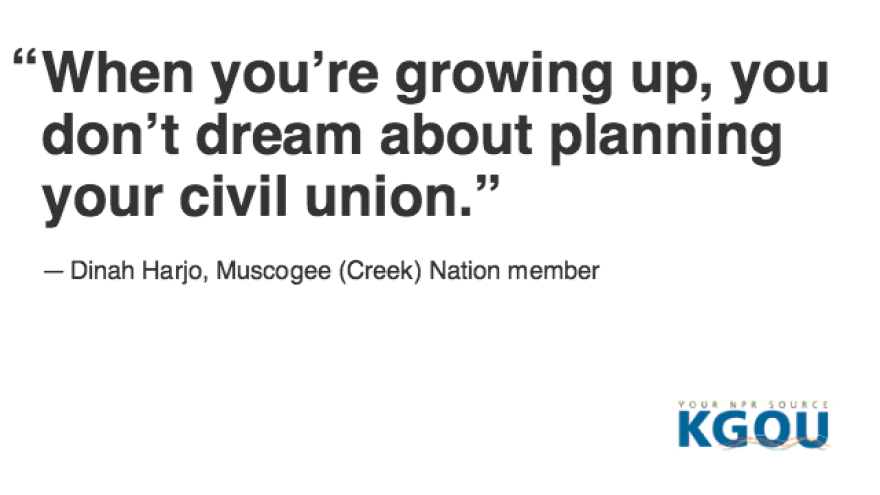The majority of tribal nations across the country do not recognize same sex marriage. Because of tribal sovereignty, the Supreme Court ruling on marriage equality does not apply.
Many gay tribal members are struggling to balance celebration for LGBTQ members across the states and the sting that comes with knowing they may not be able to marry within their own nation.
Justin and Cherrah Giles both live in and work for the Muscogee (Creek) Nation in northeast Oklahoma. They’ve been married for a few years now, but as they sit in Justin’s office and flip through wedding pictures, both laugh and swap memories.
“We had traditional food as well, so we're talking about chitahoga, sofke, salt meat, fried bread, which is an adopted traditional food,” Justin Giles said.
The couple incorporated colors from the Muscogee (Creek) seal, and the women wore traditional ribbon dresses.
“We were all decked out in that, even my groomsmen and our bridesmaids were all decked in our contemporary traditional versions of our clothing,” he said.

"Everything was Creek. This was our Big Fat Creek Wedding,” Cherrah Giles added.
The Muscogee (Creek) Nation recognizes Justin and Cherrah's marriage. Even if the state had issued their marriage license, it’d be legal on the tribal land because of reciprocity.
It’s not the same for LGBTQ couples though. Cherrah Giles is the tribe’s secretary for the Department of Community and Human Services.
“Our current tribal law does not recognize same sex marriages, whether they were performed at another tribe or a state, they're just not recognized here,” Cherrah Giles said.

For some gay Muscogee (Creek) members like Dinah Harjo, that’s hard, especially after the Supreme Court legalized same sex marriage in all fifty states earlier this summer.
“When you're growing up, you don't dream about planning your civil union. You dream about having a wedding and having the people that you love and the people that love you and support you being there,” Harjo said.
When Harjo first heard the Supreme Court’s decision, she says she was elated. But because of tribal sovereignty, the Muscogee (Creek) Nation and the other 566 tribes across the country don’t have to recognize marriage equality. Right now, most don’t.
Harjo lives in Oklahoma City and could get a marriage license through the state, but it hurts that her tribe wouldn’t recognize it.
“Just because I may be disconnected in terms of mileage, my opinion is: we are still their people and we need to eliminate barriers of discrimination,” Harjo said.
Some tribes, like the Cheyenne and Arapaho, don’t have limitations on who can marry. Laura Bird is with the National Congress of American Indians.
“Their sovereign status is for them to make laws that make sense to their people,” she said.
Each tribe has a unique heritage and set of beliefs, so it’s nearly impossible to create one decision for all nations. But something NCAI has formalized is its support for “two spirit” people, a phrase used to acknowledge a male who may act more feminine, or vice versa.
Bird says it now includes members of the LGBTQ community too.
“We support two spirit people and their equality in all aspects of their lives, including marriage.”
For NCAI, it comes down to non-discrimination for all tribal members.
And a heated discussion is taking place across Indian Country.
“It's a divided conversation, it really is,” Justin Giles from the Muscogee (Creek) Nation said.
“You're seeing some folks saying, ‘We had a two-spirit society,’ and I’m talking in a general sense as far as Indian Country goes. And then I’m also hearing, ‘Heck no, we're never going to do that,’” he said.

Giles says the Muskogee (Creek) culture and religion has absorbed aspects of Christianity over the years, so that plays into the discussion as well. Both he and his wife would like to see same sex marriage legalized on tribal land.
But his wife Cherrah insists, at least when it comes down to the rights of the couple on Muscogee (Creek) land, there’s no difference between a same sex couple and a married man and wife. Their nation recognizes a household.
“When we look at services, that doesn't limit us. Do we recognize your marriage? No. But do we recognize you as a family unit? Yes,” Cherrah says.
Unless Congress decides to mandate same sex marriage on reservations by passing a bill, it could continue to be a slow trickle of tribes that allow couples to marry no matter their sexual orientation.
KGOU is a community-supported news organization and relies on contributions from readers and listeners to fulfill its mission of public service to Oklahoma and beyond. Donate online, or by contacting our Membership department.







